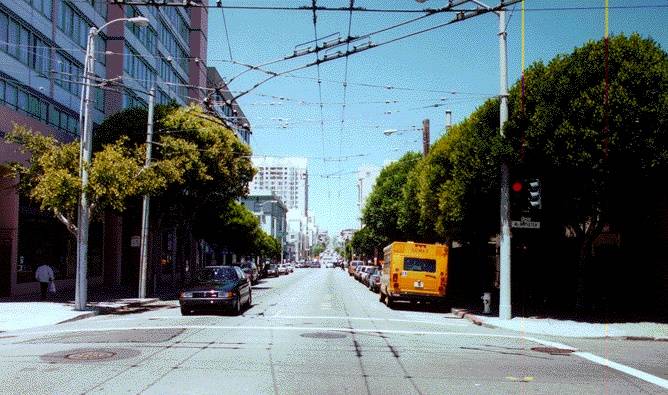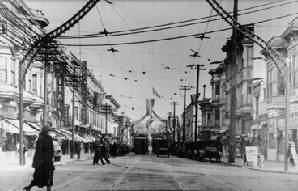Western Addition: Mid-1990s: Difference between revisions
No edit summary |
(PC) |
||
| (4 intermediate revisions by 3 users not shown) | |||
| Line 1: | Line 1: | ||
'''<font face = arial light> <font color = maroon> <font size = 3>Unfinished History</font></font> </font>''' | |||
[[Image:westaddi$fillmore-street-scene.jpg]] | [[Image:westaddi$fillmore-street-scene.jpg]] | ||
'''Fillmore Street in 1995''' | '''Fillmore Street in 1995'''<br>''Photo: Chris Carlsson'' | ||
'''May 1994:''' In an ironic twist to the story of the Western Addition redevelopment area, an attempt to start a tenants' association at the 1,100-unit Fillmore Center, the upscale condominium towers that replaced the Old Fillmore area, is being actively resisted by the building management, a company called Prometheus. Black tenants have documented several cases of discriminatory treatment regarding deposits and rentals. | '''May 1994:''' In an ironic twist to the story of the Western Addition redevelopment area, an attempt to start a tenants' association at the 1,100-unit Fillmore Center, the upscale condominium towers that replaced the Old Fillmore area, is being actively resisted by the building management, a company called Prometheus. Black tenants have documented several cases of discriminatory treatment regarding deposits and rentals. "Because we are African-Americans, we are perceived as devaluing the property," said Gloria Brown, a 39-year-old single mother, a secretary at a contractors' association. Meanwhile, she spent the past winter fighting a leaky ceiling with buckets, in the new and improved, upscale complex. (''SF Weekly, ''5/25/94) | ||
'''By March 1995''', Brown was leading the effort to get the new apartment management (Maxim Property Management) to make numerous maintenance repairs to carpets, electrical systems, and plumbing, as well as to resist the encroachment of drug dealing which has established a foothold in some units. During the major rainfall in 1995 the complex has suffered extensive flooding. | '''By March 1995''', Brown was leading the effort to get the new apartment management (Maxim Property Management) to make numerous maintenance repairs to carpets, electrical systems, and plumbing, as well as to resist the encroachment of drug dealing which has established a foothold in some units. During the major rainfall in 1995 the complex has suffered extensive flooding. | ||
| Line 11: | Line 13: | ||
[[Image:westaddi$fillmore.jpg]] | [[Image:westaddi$fillmore.jpg]] | ||
'''Fillmore Street in 1926. The arches were a famous symbol of Fillmore until they were [[Fillmore Arches Torn Down torn down]] for scrap metal in | '''Fillmore Street in 1926. The arches were a famous symbol of Fillmore until they were [[Fillmore Arches Torn Down| torn down]] for scrap metal in WWII.'''<br>''Photo: San Francisco History Center, SF Public Library'' | ||
'' | |||
San Francisco Public Library | |||
[[Beat Landmarks |Prev. Document]] [[Western Addition |Next Document]] | |||
[[ | [[category:Western Addition]] [[category:African-American]] [[category:redevelopment]] [[category:1990s]] [[category:1920s]] | ||
Latest revision as of 14:29, 18 January 2009
Unfinished History
Fillmore Street in 1995
Photo: Chris Carlsson
May 1994: In an ironic twist to the story of the Western Addition redevelopment area, an attempt to start a tenants' association at the 1,100-unit Fillmore Center, the upscale condominium towers that replaced the Old Fillmore area, is being actively resisted by the building management, a company called Prometheus. Black tenants have documented several cases of discriminatory treatment regarding deposits and rentals. "Because we are African-Americans, we are perceived as devaluing the property," said Gloria Brown, a 39-year-old single mother, a secretary at a contractors' association. Meanwhile, she spent the past winter fighting a leaky ceiling with buckets, in the new and improved, upscale complex. (SF Weekly, 5/25/94)
By March 1995, Brown was leading the effort to get the new apartment management (Maxim Property Management) to make numerous maintenance repairs to carpets, electrical systems, and plumbing, as well as to resist the encroachment of drug dealing which has established a foothold in some units. During the major rainfall in 1995 the complex has suffered extensive flooding.
--Chris Carlsson
Fillmore Street in 1926. The arches were a famous symbol of Fillmore until they were torn down for scrap metal in WWII.
Photo: San Francisco History Center, SF Public Library


